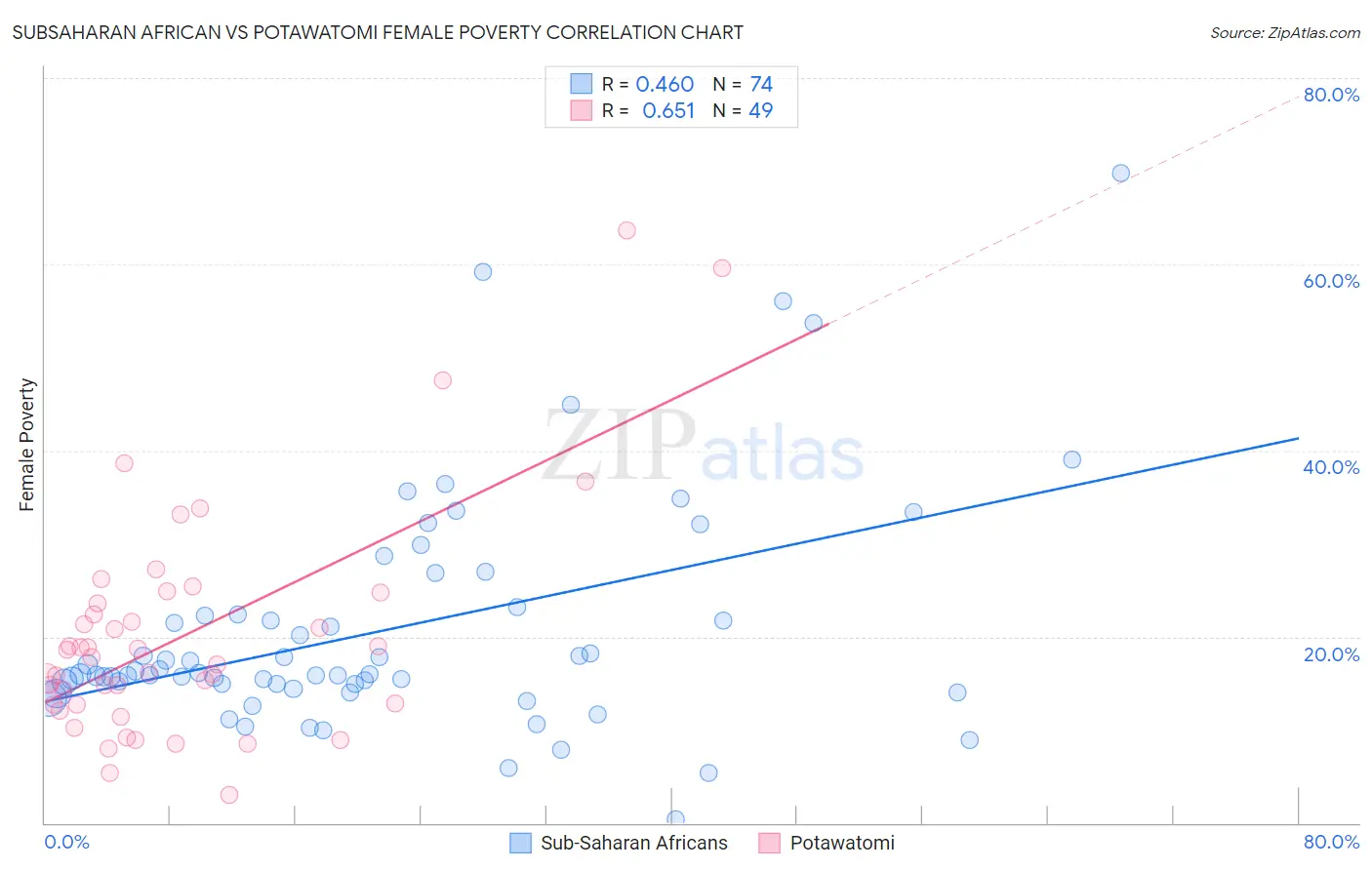Subsaharan African vs Potawatomi Female Poverty
COMPARE
Subsaharan African
Potawatomi
Female Poverty
Female Poverty Comparison
Sub-Saharan Africans
Potawatomi
15.8%
FEMALE POVERTY
0.1/ 100
METRIC RATING
267th/ 347
METRIC RANK
15.3%
FEMALE POVERTY
0.3/ 100
METRIC RATING
247th/ 347
METRIC RANK
Subsaharan African vs Potawatomi Female Poverty Correlation Chart
The statistical analysis conducted on geographies consisting of 507,469,907 people shows a moderate positive correlation between the proportion of Sub-Saharan Africans and poverty level among females in the United States with a correlation coefficient (R) of 0.460 and weighted average of 15.8%. Similarly, the statistical analysis conducted on geographies consisting of 117,742,920 people shows a significant positive correlation between the proportion of Potawatomi and poverty level among females in the United States with a correlation coefficient (R) of 0.651 and weighted average of 15.3%, a difference of 2.9%.

Female Poverty Correlation Summary
| Measurement | Subsaharan African | Potawatomi |
| Minimum | 0.38% | 3.1% |
| Maximum | 69.8% | 63.6% |
| Range | 69.4% | 60.6% |
| Mean | 20.8% | 20.2% |
| Median | 16.0% | 17.8% |
| Interquartile 25% (IQ1) | 14.9% | 12.7% |
| Interquartile 75% (IQ3) | 22.4% | 24.2% |
| Interquartile Range (IQR) | 7.5% | 11.5% |
| Standard Deviation (Sample) | 12.5% | 12.3% |
| Standard Deviation (Population) | 12.4% | 12.2% |
Demographics Similar to Sub-Saharan Africans and Potawatomi by Female Poverty
In terms of female poverty, the demographic groups most similar to Sub-Saharan Africans are Immigrants from El Salvador (15.7%, a difference of 0.43%), Immigrants from Liberia (15.7%, a difference of 0.49%), Immigrants from Ecuador (15.6%, a difference of 0.79%), Cherokee (15.6%, a difference of 0.91%), and Guyanese (15.6%, a difference of 0.93%). Similarly, the demographic groups most similar to Potawatomi are Immigrants from Ghana (15.3%, a difference of 0.0%), Salvadoran (15.3%, a difference of 0.14%), Immigrants from Western Africa (15.3%, a difference of 0.19%), Immigrants from Trinidad and Tobago (15.4%, a difference of 0.35%), and Immigrants from Burma/Myanmar (15.4%, a difference of 0.38%).
| Demographics | Rating | Rank | Female Poverty |
| Potawatomi | 0.3 /100 | #247 | Tragic 15.3% |
| Immigrants | Ghana | 0.3 /100 | #248 | Tragic 15.3% |
| Salvadorans | 0.3 /100 | #249 | Tragic 15.3% |
| Immigrants | Western Africa | 0.3 /100 | #250 | Tragic 15.3% |
| Immigrants | Trinidad and Tobago | 0.3 /100 | #251 | Tragic 15.4% |
| Immigrants | Burma/Myanmar | 0.3 /100 | #252 | Tragic 15.4% |
| Liberians | 0.2 /100 | #253 | Tragic 15.4% |
| Trinidadians and Tobagonians | 0.2 /100 | #254 | Tragic 15.4% |
| Ottawa | 0.2 /100 | #255 | Tragic 15.5% |
| Jamaicans | 0.2 /100 | #256 | Tragic 15.5% |
| Immigrants | Jamaica | 0.1 /100 | #257 | Tragic 15.6% |
| Shoshone | 0.1 /100 | #258 | Tragic 15.6% |
| Cape Verdeans | 0.1 /100 | #259 | Tragic 15.6% |
| Immigrants | Guyana | 0.1 /100 | #260 | Tragic 15.6% |
| Guyanese | 0.1 /100 | #261 | Tragic 15.6% |
| Mexican American Indians | 0.1 /100 | #262 | Tragic 15.6% |
| Cherokee | 0.1 /100 | #263 | Tragic 15.6% |
| Immigrants | Ecuador | 0.1 /100 | #264 | Tragic 15.6% |
| Immigrants | Liberia | 0.1 /100 | #265 | Tragic 15.7% |
| Immigrants | El Salvador | 0.1 /100 | #266 | Tragic 15.7% |
| Sub-Saharan Africans | 0.1 /100 | #267 | Tragic 15.8% |